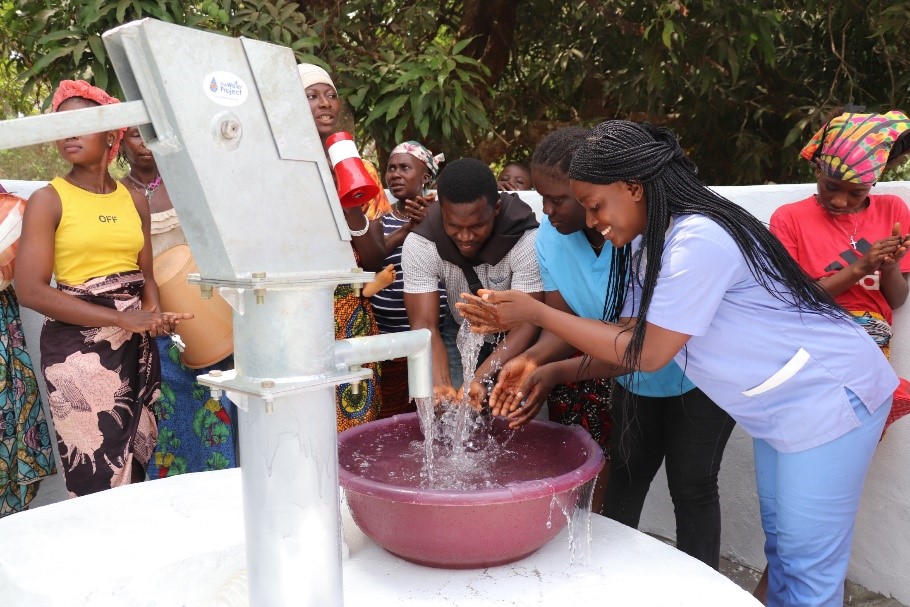Under the Japanese Supplementary Budget, the Government of Japan is today launching two one-year projects with UNOPS and UNICEF to respectively support the Government of Sierra Leone to achieve safe drinking water in Freetown and reduce malnutrition across the country.
The United Nations Office for Project Services (UNOPS) is implementing a project entitled: Urgency Support for Reducing Waterborne Diseases in Freetown in partnership with the Guma Valley Water Company. The project aims to increase access to safe water and reduce waterborne diseases in Freetown.
At the end of the project, water losses and waterborne disease will be reduced in targeted areas (Central 1: Congo Cross to Saint John, Central 2: Saint John to East End police, East 1: East End to Kissy, in Freetown City, Sierra Leone). Through this project, system operations will be optimised, and water quality and access to safe water will be improved.
UNOPS Country Manager, Sofia Goinhas, said: “Water is life and an essential resource for the sustainable development in Sierra Leone. This is why, with funds from the Government of Japan, UNOPS through its expertise will support the Guma Valley Water Company to enhance the lives of the people living in Freetown, thus uplifting their living standards through increased access to safe drinking water”.
Freetown’s water supply system has been hugely impacted by the decreasing availability of water as against the number of consumers. Resulting in an intermittent water supply system to be able to serve consumers through rationing.
Additionally, water is lost due to leakages along aged pipes, long spaghetti connections due to insufficient mains network, and water theft from undocumented consumers.
There are several causes of water pollution in Sierra Leone but, the most common is the sewage efflux and surface runoff into boreholes, streams and rivers. The project; Urgency Support for Reducing Waterborne Diseases in Freetown, will help address some of the challenges.
The United Nations Children’s Fund (UNICEF) is implementing an emergency nutrition response project in nine districts with the highest vulnerability to malnutrition and food insecurity in Sierra Leone which include the Western Area Urban, Western Area Rural, Kenema, Kailahun, Bo, Moyamba, Pujehun, Koinadugu, and Falaba.
The project aims to strengthen the humanitarian-development-peace nexus by building resilience and mitigating the impacts of the precarious food security situation in Sierra Leone through preventive nutrition services and sustaining treatment of children with severe acute malnutrition (SAM) and malnourished pregnant and lactating women.
As part of this, UNICEF aims to build the capacity of health workers and District Health Management Teams to appropriately manage and treat children with SAM, integrated quarterly outreaches, procurement of therapeutic nutrition supplies and continued empowerment of community health workers (CHWs) to screen and refer malnourished children as well as strengthening the nutrition supply chain system to enhance the delivery of emergency nutrition services at health facility and community levels.
“UNICEF Representative (Officer-in-Charge) to Sierra Leone – Liv Elin Indreiten, said. “In Sierra Leone, 26 per cent of children under five are stunted and 5.2 per cent are ‘wasted’ or too thin. Evidence suggests that a severely malnourished child has a 5-to-8-fold higher risk of mortality compared to a well-nourished child and is 11 to 13 times more likely to succumb to common childhood illnesses if not treated.”
“The generous contribution from the Government of Japan will be used to procure Ready to Use Therapeutic Food (RUTF) to treat children with severe acute malnutrition.
Although, the country has made good progress in reducing malnutrition especially stunting, wasting and underweight since 2010, still more needs to be done and this support from the Government of Japan will further consolidate the gains made so far,” Ms Indreiten added.
By the end of February 2025, UNOPS aims to reach 250,00 beneficiaries by providing access to safe drinking water in Freetown. UNICEF, by January 2025, aims to reach 761,762 beneficiaries including children in the nine districts.
This support from the Government of Japan demonstrates its tremendous commitment to contributing to the Sustainable Development Goals (SDGs) of ensuring access to water and sanitation for all and addressing global hunger and malnutrition.

